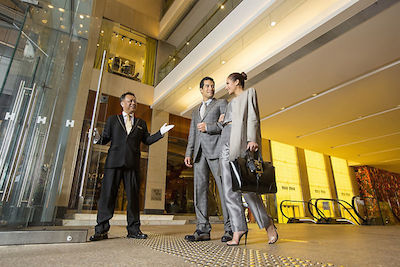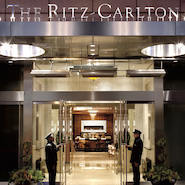Hotels are leaving guests with less to complain about, leading to the highest all-time levels of consumer satisfaction, according to new research from J.D. Power.
In 2015, 20 percent less guests noted a problem during their stay, representing the lowest occurrence since 2006. Guests’ perceptions of a hotel have a strong impact on whether they will recommend a property to friends or stay with the same brand again, so it is in a hotel’s best interest to cater to their customers’ needs from booking to check-out.
"Hotels that proactively meet guest needs have the ability to create a positive guest experience," said Rick Garlick, global travel and hospitality practice lead at J.D. Power, Westlake Village, CA.
"While service recovery is extremely important in the hotel industry, it's most effective when the entire guest experience is a positive one," he said. "Hotel staff members need to maintain a proper balance between proactively addressing needs and responding to problems effectively.
"Doing so can help guests feel good about their selection of the hotel brand and increase the likelihood they will return for another stay or recommend it to others."
For its 19th "North America Hotel Guest Satisfaction Index Study," J.D. Power gathered responses between June 2014 and May 2015 from more than 62,000 guests in Canada and the United States who stayed at a hotel in North America between May 2014 and May 2015.
Questions measured overall guest satisfaction across eight hotel segments: luxury, upper upscale, upscale, upper midscale, midscale, economy/budget, upper extended stay and extended stay. It looked at seven key factors in each segment, including reservation, check-in/check-out, guest room, food and beverage, hotel services, hotel facilities and cost and fees. Satisfaction is calculated on a 1,000-point scale.
Service centric
Out of a possible 1,000 points, satisfaction reached 804 across all hotels studied in 2015, representing a growth of 20 points from 2014 and marking the first time the index exceeded 800.
A number of factors can dramatically change a consumer’s feelings about their stay.
When staff greet guests with a smile 100 percent of the time, there is a 50 percent reduction in the average number of problems noted when compared to the incidence for those who only saw smiles sometimes.

Couples massage at Four Seasons Maui
When staff anticipate consumer needs, it can also prevent problems and negative perceptions. Those who strongly agreed that the staff knew what they needed before asked rated the hotel 310 points higher than those who strongly disagreed that staff anticipated their needs.
For respondents who were “delighted” in their stay, rating it a 10 out of 10, 80 percent say they will definitely recommend the property to friends and family. Only 2 percent of the “disappointed” scoring a hotel 5 or below say they would do the same.
Sixty-six percent of delighted guests would return to the hotel, while only 4 percent of the disappointed would stay again.

Landmark Mandarin Oriental
Consumer behavior can also affect a property’s ratings.
Those who are “scrutinizers” and thoroughly research hotels before booking on average rate a hotel 898, the highest of any group. Fifty-six percent of them are apt to say that the brand they chose was “perfect for them.”
In comparison, “price buyers” who only look at cost when booking rate satisfaction at 740, the lowest of any group.
This shows the importance of having a strong presence where consumers are likely to be researching, enabling scrutinizers to see whether a hotel will be right for them.
Stacking up
In the luxury category and across all price points, The Ritz-Carlton has the highest satisfaction index results, with 892 points.
The Four Seasons and Waldorf Astoria were about the luxury average of 857, while Fairmont was situated just below at 849.
Outside of its own hotel brand, The Ritz-Carlton gives advice based on its own service practices with those in other industries.
The Ritz-Carlton Leadership Center shared its hospitality expertise with industry experts and brand leaders this spring at its “Your Journey to Service Excellence” symposium in Dallas.
Guests of the symposium received insights from The Ritz-Carlton Leadership Center into the inner workings of creating and sustaining a successful company. The Ritz-Carlton dished out details on its internal and consumer-facing techniques that maintain the company as a luxury hotel brand across the globe (see story).
While Ritz-Carlton is number one in North America, other hotel chains top lists for other markets.
Global hotel brands often have a reputation that differs markedly across countries, reflecting the challenges inherent in scaling service, according to a new survey by the Luxury Institute.
The “2014 Luxury Hotels Brand Status Index” charts how consumers in different countries regard global brands. Interestingly, hotels received, on average, higher scores in China, indicating that new expansion efforts in the country are a culmination of everything a brand stands for (see story).
As brands enter new markets, having an already established high level of guest satisfaction is beneficial.
Final Take
Sarah Jones, staff reporter on Luxury Daily, New York
{"ct":"pF\/DZQkYBi9RfPjmWQS6E4wmugnjBnO3Ubeqs5Cj7CMQMwVkcG0L6h+9BuBv9Mz4ueCQyC1suoMhSvw9RP5cCDnxUwOW6zlGg2t6mKQgHtOqwyEBPbQUg3X1cjhcfJGDKdl\/FxPDW1Y5v6\/ONTOcYZoU1xJrPKBoN4NgUIuhTeeoA+OHEFdPJGVavcNw0JhTWqNHwUON9GQmh0vc6\/y87NNFox83Xs3YS7EtvFy3xJ6e00PuxIOeOHBCTKfR5ufWU3ZNDFUvml38rshLugudIHRo5W13a2lAtZGv\/5jfdKaT3D4m+Ant+i0GnKUhZheO9DzbPUDGRwXRWetysSx604uykFSqi7LWL42uAyqI8zOAyzVkIj9+vk097kUqajNWZPcdww7uxlVuFdw3NubNZ0Jk+\/0xOch9ivY5dsK\/4Mf2WnRYwiCOwyeA1pYaCWvk6tkaDt3BXxVW2wj6XezfBf15X+NRZJk2XNBMh8boJrLEaN98iFgv\/1EAB0FATVRbR2\/EocBP7uc7xg6RK8kKxNtgCeH2RVRRS2a2zfunXeVRtcvaDCxp58s1Ti\/3RLRKNjloqUvpxcsCQiEp\/qtsDCn+j13SlvfMBBDHF96CuPQUCitvf2Itd9Bt3Ck\/ukTmbCHlBe0Lxrxoz25NkNlgJDEsVUdgNgmeluc4LRXh5lXSQYgtY\/Vo03ihxlT31sw5Yxs86FphE7\/gt+bd4CWmr80HOe+ukEgJS5xHA0eevLKj5S74BKAwsu\/sg8psEKe9MCo6Px5lJi6b8Bm+EEFaLWc9UcsnNWY\/HKWOHeDsp9vfacV20Ddm5+2lEwVkuprvQl24qohlGnW1PslW5e8WIQQycOtieeIGe4CucxjZ+3HYYtJ1SaW0rz8OhhiPqm21c1ZsbvGSPtL5pUKw42kNOObfCNJebqOpXksPD7mq6IX1hUkr3R75fhf0ltGyaZeNYqJTXQCrw0IzCwgljdPlQKKpo11LIEELOiZTilbTR0jY7nL5ozXDgbiVFJ8UpQP7NmRxT6rWT1IN28R+T2GTrgPoa5haslFJyXPZA2zEwF22tmXkT\/YJcIbeq9bws6FQRmnUm1Mm+9cqus84mcQ+pce5vrQoOnBv0SY4ibxt1z0zr7g+r9EiCLGdOC8W6dD33irnc2Hwj8mFMTxusON2cnV2dv6fXO\/ngN+S67NyHIP4ZaivsRrThmss98h3J27clj9oCdNEIOV5O9fBARE\/C3Jmt3SB3NwZsw9XQYlNo9MtKJhblKkN5DlxWiEf3OGbw862vPJGVAVl6Wnv6JA\/mJukSV12c9mHcKp4ZovjYiMrSlFIVhORe4ScggU7usiHfy+V5ibjpOiee7IUhL\/IV18thfmOVtfAYgnGobZ1ZSfssrM6L5L07+oCczfL3c\/qJSJ1kMrWi88Z0jZ5VJBVuag7Gc+nfPISwSsyQ9KIgkCZ7BkP6VnYwaemxh79gipQFt+UebHB5CKlupU0OaglM0bBXx3pzmzGlfOxTiJGgmiZHkM46E1danbcZybPpTP+N3s9B\/qKlp2aBlTeBy4l3rFrQGepSjmtdozyU9FOwJ1ADVKJeR5ZFqu4losVG1PGs2hjwusUYn+5UYvREAnpHRVkMAoNUAQVEK4lpjHhZVgGnLYu4pCHM3cRTFSfMgO+R85R+96kTgeRUzBROinc\/YwDivg63meVEI7pv2xlidwSymOYqgMcYU7iP+yXXtMowol57QvglzIa0BEHMYCndlJNUfFMVFew3Tb7zzJeoJUG9grgamRyfm0koVG8p2cIm1snYqd3KyYnqYlK\/IR0kBlrUZHBuDnJ4va75lmCYRR9nDM7a1PW3in5pxQb3I\/9Y7dJOw9LUf5J3fPzcMNz+9sT85IgOMTbyJoM2qvog6q9jJMS22\/W0Mk7xiYYQHWA4EU1YFJjGdg9yj627x0Z+AFZ\/IWcdlrl3RveIlGK5VMsCJir9n5mEPnia+uFSqOOrzRADsNhL74WQiOBpsjyhWUM1QJNGhXYjQOa7ezuc7y2XqDUMp7v0d5ipFR6yL7tPamD9zsm+iCtZ6s8d8kOPpASOINl2jpR\/vgDbDS8QBjJ86AwvBrA+1eqFTy4\/QGSvGJ2v5VfBdD0+PTyH2+piiQ2fipvzQTcXsUC2jtbp+u4CosNzRY3cnehkGDrtAf0tracjRXm5vHvTkuE\/9Qy2FNATEmvpGrALtphcs9l6782EOBVgqxrz5\/b7ke+vlBhshZERt3WXgTl0Z9g4LmPjDRjIkht5g64UsTzrpYxY63M08WqS8jRMjH+7NENch3IUBC9VnLokIn3tysB7zTioeq30yoSR+PBillVNrHdPK5mRmjys32uHKTb3sgDk9VnaWd9C9pUxj7VhKUpA0re5mccCjd05b8x9N8G2qlEvB+hxzVFPBGDz5v\/6Dm5GeNIvwEK6lzHZmXhvjJ42FDeVz1kQpSJSq\/jKR6DiQBKcURPaxEU+wrxSIT9oqXZf0kymCZT8tM9bx\/hXs0vcsn7LNlzYAFxyLT7mywoKjOTDnqqTnuzuQGJD9VglA9lScrGOmbHW62q06FQph7+4jGm3jpaarDCM5g3nt7hgAmnrgIhGijhzMmpOdqp5aMEvGpfyqqPS7nlWkorIOkGqocu+jiDi4bWt6cCGO652Jv\/jtYx8FSKljPIlBJsNhDRNHv5YqSjx8FIa6hmy2fLh+7iJ4C2BRBGNVXlLz1FYFWg3nZc2yUK4TSZdxUyfYIuVTUI04lX7fRwBuZwHnXEPdd0HLv+xpuUymxNhwx\/Ii6g1Jg6IMP9tBLuAj8XtdVSKuzz8izF0Ph3PKc7zDzTiQUBOyaF82VurJSbfJewOB3TQ8thIe1kf8871i1WvItS0SwHgb\/OA6gQYZUiJar33TJpFaQnYlZnv+4yYETsraxsbSm+HQ6iWlYhUk872bIM207hiK3pWxLu2RtyggToPaVJ4vivpv6gc9gpsijMNBl0Yc9JLZnZHAOrNAqPRQMbriJr6EEPAgw6KD4dC4mEVKViZv48LnGrVK1reajWuc+w6lkeqHXFgDXLMHakiRuqm9mXLU0T+Azcu6f4W11jpFgn1ZIldmxGFYyVjmrvAphTfoizxjUmvlZAmmdB68uQM3mUvawQWGuJODF\/5+uAUE9kvY0M1pKxv4Cl9Li71aBMte7LKPFJ+mjdsPj+p59UcWO9Nbxz2C8\/ZWwF7fp53y0\/OVLVHrA6uU3p9bTe2s6xMGJBFuJnCHI3GPXWCMiH94M2DLTXIjjXNXxHFSTjJTnH3APtb4kdZc\/ura1ZuGqrCi2U0H86xomRlhYWOwm6qIdFhfrwF955xNryt4hyCh0kYgFHg4M6uxcxiXaLHSnkQWMxchmIkJ2mCBepdKYNHArbRmFxG6X\/U98lk6HwBnG4cLwQrO4+x1WIvE5oT5R3B+82ZjMMBpIiIEzHQmhd+67IR9SCD843vgvb03WCD99Z3MsSrOOihrnvwGCSf1TM72ZdmH\/ADrsPCXTmMcRWIEV6lS5BvAiMRcuecbbGIumPp3ZzXq1cSEUXSRXnFiw3ib2CeaX0GVg7yedKfCuT9flW3ZS6NsqX\/sZZhCWOWjAoNOLteGxbQmIslNo+LmV0OHPQ1DR1cmeXsHvqeC+6RiRIExbqPTl\/xwJY3SFdmX3BHFsPgyTs0duRDGUwWC2+LJGFZ\/AEWI9XrZ6a+\/y52MB+gFPeN0H9mi6Qj6T8rVet3CSRgXK3Vfojfy8BCyxU+G0bh+FP3g94lWQIim+E6MycZ3D5zF36IFgVcH1AaMTRiSEQGdg5LFyxFjzQkVVzlJm6ctVvlwU\/JNaOFhEMWgIA7uOKcqOCYVs5bIBxD3FUmzcuPTy5P5n3920OFYVPNcAy389jLnZhHDRdnhcPEmgwnV2uRVmPxEBT2xiu2qZIoc7ASCleeUFkFPl8nKnZ\/NNQo77DzRt0x\/gHAw2J9ZdY4vW+I47V0Xi9\/HcU\/zbU4ROz5s1zDGCQ5yQA+Il5Ul0jNhikXPl6D7iHGovh5AtnNNPRA1U0K0995eR+ZTZqVCF\/KnJhrNIRrtkHzQacXzgq0JFaQHkBLHosztiqQabIb0VfArXH9RhczFKlyXihUC9+5h9z8Wm3CUWUn5kPAj+QcXOtPGBczmmgDQS5db1xu3pR+x1cC+b1\/vEDdw\/8DOrUyHpxQj+TmHJCyHAeSwnYCr3xN\/DHtNTvgepOu5Mi+cBvGByA0pJ5ijCaTqC\/5y5\/XJJCDwLfTKDa5rTF26MbIIrxc8G3WAcne3MkkIw3rob4t0eRzQ0i\/JcEEecjjAvPoQy+WebyjbO3HmoMvs8J94DtE20jxUjdJosBmLokLCXxnR+viF6FwvaH0XhrYM+FvePqNF9JbADyhJcygOCMB8V54lNMf\/+i\/G3fboxXtM7mJ63fFyILgBJSH0O7FgCiHSX26Szq0xfTjnScIt23PNfQC9KNi+s75LNHmc5C60ruAZSzmWc3vVXuBkcpsE\/9r\/tVFSp5UftIus+jngm4XQyMEsDm5YQ1pjvffha6s0R8Dnd8NyIqYPQBgav7ZR72C+RExLHPgul+0+PmbK3v7JKQFU7qMGqZdd2UCFCUkNJUvD8o2BJUdTfSA1jTSCUn8g+J1MhHWtQa6nnjeHA0yuN3HzRUMmLE9K2iDpx9rzl7gl+dFBcYB3NgqhrUMvGdd4ffKCqjhcL8LOpvCD\/mik+nYLoEG4o494gwwF+ygZBqmMi55uhhkzNcIeHJLF1B9u4f6UJigPXWeQHhIDkkmV++glPJkXM2j\/auOYjniuAUqzHrZ79qiIRcqtVqwM6Xg7GtcXA7t8C4u04M46hdnt3SeB9ojsOLhf7LL9HjXZVLakOKgkhbr0eoQEI0yeNwBL6x4ptXvatiQ1IxM2PNas0Pz903BP4+OlALKf79BnKf+2dhIjpjY+vKGMI8Vogq4deNx95I2kWyhkK7rAD8FoYBrBLnbjyZM4yb9RHWxA4e3ZFsLZDnf9K2R50VQ8z7kvuR2tE2pTowr2NNgMJOlrfyyJ9eTqc51RPPVHf2\/XsaIUVD7MxQPmWZkZ8J+IC68lT9NeaVTg\/rsddGsd7b9baJzVCZ3NFN\/1jw\/PkJ7+zF1LJXTLusvI1t6THDQHYYnst+epUQwYOZl74nrckQrX9Op01XXiAhYFF7aUqJzUKRJj9M0JUEUAxwW4+5YQL1l1KWFyujqBzhX6YYXcrvNsnwZLXIiOOEicbC93adT8cRoam9rI2xX6qu+vl\/L3HAPsxSquRETNf3LLpqQlZAy531j4lBdmE+pmqLtZAFC8GtyZJ5tNuJejSBIuzKhX2abtLrftjAJpofBrotR5W4NxCso0Lju3mb7nyVizRqegq8EkyOGyoMlZWnG6vpD3L\/d5uEmpMt74YlVC7T8zoJUy6KNCEGNA8a1heBD5uVg35AOXFqIK5jhJWpn6WQ3+7Urgl+qkWAGIDERVNlsYCpqcB4RoBHBO0ISEjITjRCQHGtIHvwv6GE2NOS43I+2PNToziCk11u0bWScHhJo53S3h7KUbHH2s3arifvMDpoPXuEfUGIdHr531JDtm6Vjwq0iMpdzRPJquI4UXlFDIP+xjQ03xscPzDtwIt+HKT4LU2yozV4hk0x5LT5b4vP+k5phhULwfyKVncX2GVEWRiTB0LS6nPfnRs9pe8+nq5Uk0m3kv451HU0WJcgYAFTPj9rfPbeAh6uZ9Tpc4IDJlrT\/rWJ3dQgDnU+L+DRAgierSb9IzjwD8RBgOajzLaIkz8\/Lwf21ZRYTgEGArjvsngK8DBz90maXsEJFPkM5sW20occ5pxVqtYiLYpzFfETerJ\/u2yv7113VfRHxtOyYPFPfG14\/s8Mdh45a4pzIDhjNPu8vGA2g9AKwW8+uCl8xAtCx6Lq\/JpEI9W2q6fYu6y1y8yt8YJDIueq2Dbg1roHBC52EV9fhwK5RXJMkHBIuT85\/v5YThzGXAUGz8Jla\/wkv9kjOlTYxSf2Cf\/PGuyxxnPcTwf5l17Da2tNhu+EfPv+25m9GWIs1g3AQWfpL0KrB54UADecNi3FdwTkFPkU0rIVL\/gBC2gRy3pzY7VYhXSbeh3Z40KS5QXTIvOnXSec4c8yuoQtvdqHzBxdQ07d0pWnR7HLyPmSrW+SSqkFKx9hrb7a7H15uB5GvNJGs5\/FTEgy\/PqwwORPjbDhwAhG8HcRVJHotz89kWJ91+gg79KdEzBDteT4o+TKlnnlKWPuYKQhkznUpuxx\/ttLDVsMgiTWROlVqaEEMjFfKVo7vzr6YlFQteb4Y0f+uwrR2NhnNExG8hzEWJbKikUiOiCK0RVv3eEbdTYBKrIx0zdfGGqxZOdTZfSm5WkrRYKC33v50BX1HANxi5Zh301GUIFlIhy34xGcODKfTuTTCytQtBAX0j0RFhvDhM0ujxwgggAc\/P4etMnPO+PrEqsweO5anq5b+cyQDuswBegVoXMOGfgmCXjCQyq1RQGmB23q5KrDRFj7UfoPjMVxN5ibZwJiV+4enojMkbnivl6nn+AXZrH08ikwjgwxey+55w3E0RqxsRkA6W+wNU9INKoxzVW+sO6Em6NOxnYZMm8EkQaeiahy1DlvgFPwLMpIDGzZygNb4khpuH7M43wThv0r+CTknWL\/og9QXRUmnlV9UYj+23CL1mKuOzvvz9YQVL\/4kNpPrSc3FZBE+0bQ0Cly0VG2vahlMYfXzQXItMG4gWyramS8CzL71uP6iuUxUK1wE7ySa\/kGaFlnTChf5GMKbhIOCG572y4t2cV2Ewzwk19GvAh8AQuI1FjdqAKspsPz2PQW5UT4PHCRBGGfFlXX+6N183OEqUwlyTabSHI6wt\/RJ8S564lpNDohYj0BFl36YCg1XQ6nsg3uKl7JFhSb3Vcxnekfrf5V29qLkH2cxIZc9vjDsEYy6EOC5+18cuGz9Y7aumzGXdu\/m6SH8kqXChRzgbNwnsCWkXWSdEhT88Qtjew6KEYLQfZacZ05xwvK501NfvTlXutgQ9FJpODSl0iObo7sIstmF9KpczZh7zzHQtVxeET9ZrlsBgURdWwuMlkrR0kgeDqpqqB2T3zer47GzernmAAdnieWM\/CjQQTdWE3QKbjnUxuCPfNJxQkiV6T0oQ0h7lsY7\/OqwBjZtGJBuF1L85k7MpHD+\/qKFe2B92VZrOVJXv3V4Q\/dVOQpjIVSvIRl3JHOB2\/x9YhwSp6AlTinbZ6IzhJKOqofVlVzP1SBsSIfd0dOrpu\/dYe\/RSqL5X67oGQCImDg\/IaRPx7\/J4E20nTwwvzrvyg57AiypfgLV0c53Btr0nDcVEFfUeFnxwA215mGhtTsJgCQm3psWqxTIjHJAGkPF80TTCY\/RFMwNEgSGvUxUl9NkrK90n5kyOm1TExpY0pnOV+hbZiPAIDy7\/+ZDeToBspIcbVex68Fm9i7bnmCP22uSkf0lgHeGO18le0Ofuv77Y1IcRIh9pV1jVZHt6E7EQ+lauEPLJ0cXU\/gMj9tqSPaUQHbOnF6ijoADhBPQ3OjPVegAHQY7+o8ffT7Q6UySBXMokjxkC6pxvY6dVeFlt\/3Crxcvhbzr2jhkEbiicZLBxEtCC4araLWuE578AZxls3jSRJfOUdCNYYxW4obAZvtdUyXw24ieW0t4eKZRsWDUFvC3I9gPDpoGIWEGsPRccw4hHisxLESXCnYt57TvV+5z0VDRWHQqHjSbJLpPL6VDTuytKDTDJqv8yw\/76I1GAK3QG9CVQwbrPVs4vCmerVkGkHLlQrqkDkl\/pPCJYesss6j38S9lc333LNrIzS\/jWVvj4WpI5OS8ApqhiCe1aL2U+KKuIjpHv40P5md\/evi7NYT78woPpSIf0Gv7aawO5idK+Y73tUleLB4GhbKjKd1gf4CavTgJOZyFo\/L6Wj8CX\/8YdjQBZEkKZqs0JLwXlzbbyqjsd0BGlE4UaRA5TnBp4\/HaVE+FD9F32NKgI2YdkudMsvPMXA+0noW2qSEYxi5ynZn1MohLQ6ucfitxcyRBHbA2DDKDofJIPTmv5up4emJ8vPyIF++fDvV9TihMysjSQ2XrT7M2KC9UVbHT68dItojpst+QIljE3A+zzv4Zbs7qy0SFSATAgipyHp0J4cfdK08sJeQeZrdk5BIWPvODEKWTcTj5l\/HKP8RcQ+tSBOGm8x6hOOU0AQC1WetR70YhytgKRx\/GgUkCkH9iPC9hNxMbVl0jfBvyzWX2TeLfIAgcYRM9qszBzggkdZW4mDN6deKgTOyqfzJMiBiWWheYz2mnzfETb5sfQvgcmMO9TSAYyjWG1eE+g+53l0UuM9wl2TXc\/k5rLy8LOT2+cSZPylfQzmJ+Crt3z69w\/vGHOD1hRMpryThN+dbdHXdfzn0dVE5\/ZmKfHlnSWNvKO+MCUCMU\/v0USmCLCXzhug\/Eg6\/unkm3eU6PZ7BJhTeykif8AUMsWZ70HDhJct8YvTD2a00XSGW\/zLp7zFJXmcHe\/EEhy7LO9iJe\/9Je0JBNhtm2A7w3QXvS7xVt8lDM\/bKIZntiwChzqu0huKQ1Fotvd\/RqSPpGCU9mAZsLJ2xDZp4mVL9fmqd3KxDJBGGvh5b8OdG0O2KPAZl5OLlzNl9Jz9QB6N7UTgdl+lMUwZ51zQ0wfAbcATcoOddJRxFkPoXQV8JH2rGe10oABxKab3ClfJqBSetLjh4SeEci9Vj6z8L4+7iyJD1OUpVUR3ByRnJCl3vK1p66gk2BV067fB7gCxRsh+KWfYOu3avhNi1s5gitvFPmEhNLTZ6MJjEGRBulM0JrQ4R2VivaPUPbV4q1yhCrN9vNldYQxr13GVn+yknyB7moH2ZioTaEq4C+wYiSHQWwrzHDwOR6mR4AI3f6ZEHbUmZt074SiCTqm2f\/YfxgwvP5t43VRkzyaMNoJ2tEjHnsS34LZ9BteMyk6oxiAUCCnDDbd+ciJjvrUXTueCCLOq6b5442N5AOH+UwgeXt4YGdde4WgOqRMSkyRSa57kpAsthQamCHeC6h4VbgSiLayDADqFwd1D738irKhyuBsBGHzmN4shO1l7bflmri8jxCJ\/1bLs7My+i8W1qqdCzx7QsOmifMCUWpfazT20LPrGuAiMtXPg6ZJGoqSDPhcvvdOEx7tJdt4yqxG2nd9Qt2fsemAfawEMyLndnSbLgmgcsfoE1Wgd+91TcmEymo66Z6b9\/QlItBABBex\/NDWqTmK6t7E0c7GaqObrSWee\/pourVfwhagonl6oHeYeWwDhPktvMLZjFECl+odUQutsDTT+QonDa7zom9AhWnQWGJhIeKqQ\/Z\/ROUns3geCq0j1lZa6n8O6GnqEkHriRPIjac\/pQ94pcX9EWXNpyBb4B4UQDFrihqEra6JiopcKDC2+sKA+3eSdHD+L3gz4xDYHZ3ZhIAQ==","iv":"d896b222a2a7a24bd7a25013973b6b38","s":"7d42480e8382c5b0"}

 Exterior of Ritz-Carlton Boston
Exterior of Ritz-Carlton Boston